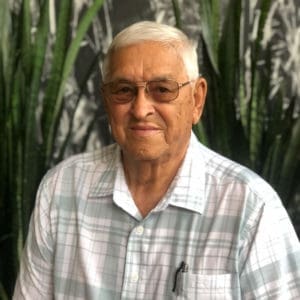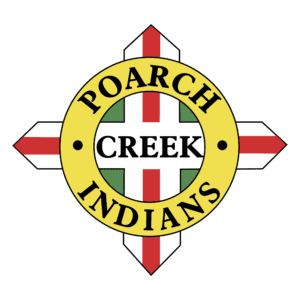The Poarch Band of Creek Indians are a federally recognized tribe of American Indians located in Alabama. Of the Band’s 2,340 members, about 1,000 live on or near the 230-acre reservation (as recorded in 2006). The Poarch Band also holds other trust lands in Alabama and Florida. Their current tribal chairwoman is Stephanie Bryan.
Members descend from Muscogee Creek Indians and speak the Muscogee language. To be eligible to enroll in the Poarch Band tribe, people must be descended from one or more American Indians listed on one of three rolls: the 1870 U.S. Census of Escambia County, Alabama; 1900 U.S. Census of Escambia County, Alabama; or 1900 U.S. Special Indian Census of Monroe County, Alabama.
Besides being of direct Muscogee Creek heritage, they must have a minimum blood quantum of 1/4 American Indian blood (equivalent to one full-blooded Creek grandparent) and not be enrolled in any other tribe. Each federally recognized tribe has the right to make its own rules of citizenship.
Many of the Creek families remained in Alabama despite the Indian Removal Act of 1830, by which most of the tribe ceded their land and were forcibly moved to Indian Territory west of the Mississippi River. Under provisions of the Treaty of Fort Jackson, Poarch Creek ancestors selected four sections of land that would serve as the center of the modern Poarch Band of Creek Indian community. These Indian reserves were held subject to federal trust restrictions.
Large corporations bought public lands, closing access to tribal subsistence practices. Jim Crow segregation and other forms of overt racism limited opportunities for economic advancement for group members. Because they had stayed behind and not removed with the main body of the Creek Nation after the 1830s, members of the Poarch Band received no federal aid or recognition of their Indigenous status at the tribal level. Those who remained in Alabama had to give up their tribal membership, and were considered United States citizens.
Gaining Tribal Rights
After World War II, Calvin McGhee, a descendant of Poarch Band founder Lynn McGhee, began organizing the Creeks of southern Alabama and northern Florida to pursue land claims and other rights denied them as Indigenous Americans. Under McGhee, the group filed a lawsuit for equal education and won their case.
 McGhee also spearheaded an effort to file a lands claim case with the Indian Claims Commission. He formed a group that became the Creek Nation East of the Mississippi, which pursued a case for compensation for lands lost by the Creeks in the 19th century. Through the lands claims litigation, Bufford Rollins and National Indian Council on Aging Board Member Eddie Tullis emerged as leaders of the Poarch Creek community.
McGhee also spearheaded an effort to file a lands claim case with the Indian Claims Commission. He formed a group that became the Creek Nation East of the Mississippi, which pursued a case for compensation for lands lost by the Creeks in the 19th century. Through the lands claims litigation, Bufford Rollins and National Indian Council on Aging Board Member Eddie Tullis emerged as leaders of the Poarch Creek community.
The Poarch Band of Creek Indians secured federal grants and established federal job training, Headstart, and Department of Education Title IV Indian Education programs. The Band also worked to formalize its government structures. In the first years of the 1970s McGhee, Tullis, and Rollins established the modern Poarch Band of Creek Indians government centered near Poarch, Alabama.
 After the death of McGhee in the early 1970s, Tullis was elected as McGhee’s successor. The Band joined the National Congress of American Indians and with a federal Administration for Native Americans grant, the Band secured funding to petition for federal tribal recognition during the 1970s.
After the death of McGhee in the early 1970s, Tullis was elected as McGhee’s successor. The Band joined the National Congress of American Indians and with a federal Administration for Native Americans grant, the Band secured funding to petition for federal tribal recognition during the 1970s.
The Band utilized federal land records, censuses, court records, and school documents to prove they were a surviving Creek enclave, eligible for federal tribal status under the Bureau of Indian Affairs’ Federal Acknowledgment Process regulations created in 1978. The Band was successful and became one of the first tribes to secure federal status through the federal process in 1984. Afterward, they were able to have a 229-acre tract taken into trust as a federal Indian Reservation and to re-establish their own government under a written constitution.
Hi
My name is Jeanette Hall and I would like to help. Growing up, my siblings and I were told that we had blood lines of the Muskogee Creeks but nothing was ever done about it . My Father’s Mother and his aunt use to tell us about Red Creeks and Black Creeks. We grew up in Georgia, but there was always the feeling of something missing. We want to know more. over the years, my sister and I met 2 medicine men who really read our lives., but they are gone now and so is many of our family members. Thank you for reading this. I hope to hear from you soon.
Hi my name is Mae my mom was born and raised in Mobile Alabama my grandfather still live there he is porch Creek Indians I am a descendant my grandfather name is Nolan Craig and he still lives in Mobile Alabama I’ve been trying to figure this out for years I am 52 years old and I have two other siblings and I just want to know how I can be part of my porch Creek Family
Hello Mae! I’m not sure. I’d start by contacting the Poarch Band of Creek Indians at https://pci-nsn.gov/contact-us/. Thank you for your inquiry! I hope this helps!
My maternal grandfather was from Andalusia and he was Poarch Creek. My mother and father lived in Pensacola, I believe that my father is also Indian… that’s what we always referred to our ancestry as being. I have attempted to make contact with the Poarch Band of Creek Indians several times to no avail. I am pursuing a DNA test and search to confirm before I reach out again. I know that I belong.
My name is Jayme Bonds and I’m a descendant of a creek Indian Jane Trailor Holloway from Opelika Alabama. I’ve been searching for years for the reservation my family lived on, because I heard that in the 1800s to early 1900s if Indians married colored folks outside their race they weren’t acknowledged anymore. I know the federal government did a small documentary on my great great-grandmother Jane Trailor Holloway while she lived on a plantation. If I can get some assistance in finding out how to get more information it would mean a great deal.
My name is Tracy I was born in Mississippi and raised in Alabama, I would love to know if I have creek in me, I was told my grandmother Rosa Lee Dee’s was creek but I never met her, she was dead when I was born
Grandparents that were poarch creek Indian – Laverne Stabler – deceased
Uncle – Michael Stabler -deceased
Uncle – Davy Stabler – living
Cousin – Melba Manc -living
My grandfather was full-blooded Creek Indian. He married my grandmother, a white woman with English ancestry. Does this make my father 1/2 Creek Indian?
Hello Wanda, thank you for your question. From conducting my own research to your question — Yes, technically this would make your father 1/2 Creek Indian. However, to get a definite answer, I would suggest going to the Porch Creek Indian website at https://pci-nsn.gov/our-government/enrollment/ and ask your question to their department.